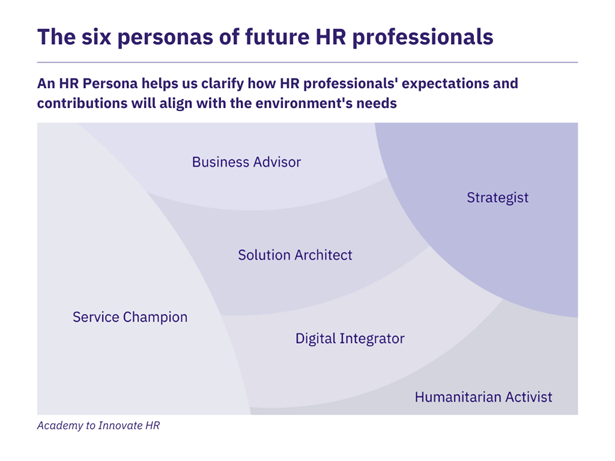
Six HR Personas to embrace the future of work
Author: Dr. Dieter Veldsman and Dr. Marna van der Merwe
HR has come a long way from its origins in labor relations and personnel management to becoming a strategic business partner deeply integrated within organizations. Looking toward the future, the global disruptions facing organizations will once again require HR professionals to evolve their role and contribution to the business.
This article delves into six emerging HR personas, highlighting the evolving contributions of HR professionals to business success and sustainability.
The six personas of future HR professionals
Thinking about HR through the lens of HR personas helps us clarify how HR’s contributions align with the needs of the business and stakeholder landscape. While personas are not necessarily mutually exclusive, they outline the expectations held of HR professionals and also guide how to navigate HR careers. We use our T-shaped HR competency model to define these personas and what is required for success.

The Service Champion
The Service Champion is dedicated to ensuring operational excellence in HR service delivery. This persona is responsible for managing the core HR processes—recruitment, payroll, benefits, compliance, and employee relations—efficiently and effectively. Their focus on operational excellence reduces friction in HR processes, improves employee experience, reduces administrative costs, and enhances compliance with regulations.
The following roles are typically associated with this persona:
- HR Operations Manager
- Payroll Manager
- Employee Relations Specialist
- HR Generalist
The Business Advisor
Business Advisors offer strategic counsel that helps leaders make informed people decisions. Their ability to understand the business context and HR dynamics allows them to offer guidance that enhances productivity, drives engagement, and supports growth. This persona is highly skilled at relationship management, negotiation, and navigating the complexities of organizational politics.
Roles that are typically associated with this persona include:
- HR Business Partner (HRBP)
- Talent Acquisition Partner
- Senior HR Consultant
- Employee Relations Manager
The Solution Architect
Solution Architects provide businesses with scalable, innovative HR solutions that improve employee performance, experience and engagement. By integrating technology and data-driven approaches, they streamline HR processes, increase efficiency, and contribute to a more dynamic organization. This persona is adept at leveraging digital tools, data analytics, and creative approaches to build efficient systems.
The typical roles associated with this persona include:
- HR Systems Analyst
- Talent Management Specialist
- HR Technology Lead
- Organizational Effectiveness Consultant
The Digital Integrator
The Digital Integrator leads the charge in transforming HR by adopting advanced technologies such as artificial intelligence, automation, and data analytics. This persona actively explores new tools that streamline HR processes, improve decision-making, and enhance efficiency. Digital Integrators are at the forefront of digital transformation, helping the organization stay competitive in an evolving tech landscape.
These roles are typically associated with the Digital Integrator persona:
- HR Technology Specialist
- People Analytics Lead
- AI-Driven Recruitment Manager
- Digital Transformation Officer (HR)
The Humanitarian Activist
The Humanitarian Activist champions employee well-being, diversity, inclusion, and ethical practices. This persona focuses on creating a compassionate, people-centered work environment where all employees feel valued and included. They advocate for organizational initiatives prioritizing mental health, work-life balance, and social responsibility, ensuring that the workplace is safe and supportive for all.
Roles within HR that typically represent this persona include:
- Diversity, Equity, and Inclusion (DEI) Manager
- Employee Well-being Coordinator
- Corporate Social Responsibility (CSR) Specialist
- Workplace Ethics Officer
The Strategist
The Strategist is responsible for aligning the people strategy with business goals. They understand internal business dynamics and external market forces, enabling them to integrate HR initiatives that supports long-term organizational success. Strategists are forward-thinking, using data and insights to make informed decisions that drive competitive advantage. The Strategist adds business value by ensuring that HR is not a standalone function but an integral part of the business strategy.
The typical roles associated with the Strategist persona include:
- Chief Human Resources Officer (CHRO)
- HR Director
- VP of People and Strategy
- Organizational Development Leader
The role of mindset, heartset and purpose
While each persona may require specific skills, success in the future of HR will depend on developing the right mindset, heartset, and purpose.
- Mindset: HR professionals must be curious, adaptable, and able to navigate complexity. Those with a growth mindset will lead the way in a world that demands agility.
- Heartset: Courage and self-belief are the foundations of the HR heartset. HR professionals must challenge the status quo, even when faced with resistance. This drives meaningful change.
- Purpose: Every HR professional must understand why they chose HR as a profession and the impact they wish to make. This purpose guides every action and decision of HR professionals.
Embracing the Future
The future calls for HR to discover its true potential, amplify its voice, and broaden its influence beyond traditional boundaries. However, this transformation is not based on skills alone. It must be anchored in the right mindset, courage and purpose that aligns HR professional with the impact they wat to create.
Author Bios
Dr. Dieter Veldsman is the Chief HR Scientist at the Academy to Innovate HR. He is an organizational psychologist with 15+ years of experience across the HR value chain and lifecycle, having worked for and consulted with various organizations in EMEA, APAC, and LATAM. He has held the positions of Group Chief People Officer, Organizational Effectiveness Executive, Director of Consulting Solutions, and Chief Research Scientist. He is a regular speaker on the topics of Strategic HR, Future of Work, AI in HR, Employee Experience and Organizational Development.
Dr. Marna van der Merwe is an Organizational Psychologist and HR Subject Matter Expert at AIHR. She has over 13 years of experience in Human Resources, Organizational Effectiveness, and Strategic Talent Management. She is a researcher, published author, and regular conference speaker on talent management, experience design, and the changing nature of careers. Marna holds a PhD in Organizational Psychology, specifically focused on talent management and careers in the future of work.
The views and opinions expressed in this blog post belong solely to the original author(s) and do not necessarily represent the views and opinions of CPHR Alberta.
The views and opinions expressed in this blog post belong solely to the original author(s) and do not necessarily represent the views and opinions of CPHR Alberta.





